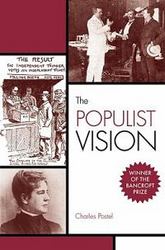Description
The Populist movement in the late 1800s was a response to the challenges of modernity, such as the growth of corporations and the rich accumulation of wealth. The movement represented a different vision for modern America, one that emphasized scientific and technical knowledge, centralized organization, and cooperative businesses. The Populists also pushed for reforms on the model of the nation's most elaborate bureaucracy - the Postal Service.
In the late nineteenth century, monumental technological innovations like the telegraph and steam power made America and the world a much smaller place. New technologies also made possible large-scale organization and centralization. Corporations grew exponentially and the rich amassed great fortunes. Those on the short end of these wrenching changes responded in the Populist revolt, one of the most effective challenges to corporate power in American history. But what did Populism represent? Half a century ago, scholars such as Richard Hofstadter portrayed the Populist movement as an irrational response of backward-looking farmers to the challenges of modernity. Since then, the romantic notion of Populism as the resistance movement of tradition-based and pre-modern communities to a modern and commercial society has prevailed. In a broad, innovative reassessment, based on a deep reading of archival sources,
The Populist Vision argues that the Populists understood themselves as--and were in fact--modern people, who pursued an alternate vision for modern America. Taking into account both the leaders and the led,
The Populist Vision uses a wide lens, focusing on the farmers, both black and white, men and women, while also looking at wager workers and bohemian urbanites. From Texas to the Dakotas, from Georgia to California, farmer Populists strove to use the new innovations for their own ends. They sought scientific and technical knowledge, formed highly centralized organizations, launched large-scale cooperative businesses, and pressed for reforms on the model of the nation's most elaborate bureaucracy - the Postal Service. Hundreds of thousands of Populist farm women sought education, employment in schools and offices, and a more modern life. Miners, railroad workers, and other labor Populists joined with farmers to give impetus to the regulatory state. Activists from Chicago, San Francisco, and other new cities provided Populism with a dynamic urban dimension This major reassessment of the Populist experience is essential reading for anyone interested in the politics, society, and culture of modern America.
